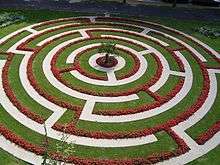maze
English
Etymology
From Middle English mase, from an aphetic variant of Middle English masen (“to perplex, bewilder”); or perhaps from Old English *mæs (“delusion, bewilderment”); akin to Old English āmasian (“to perplex, confound”), Icelandic masa (“to chatter”). More at amaze.

A maze in a garden. The objective is to find one's way to the center, by walking along the white paths
Noun
maze (plural mazes)
- A labyrinth; a puzzle consisting of a complicated network of paths or passages, the aim of which is to find one's way.
- 2012 May 30, Hayley Spurway, “Top 10 family days out in south Devon”, in the Guardian:
- There's plenty for toddlers too: experience the Wild West in Bear City, play with sand diggers, splash in the paddling pool and discover meerkats, reptiles and alpacas in the Zoo-Farm. Rain doesn't stop play, just head for the indoor fun factory with a rocking and rolling tugboat, mirror maze, ferris wheel and soft play.
-
- Something made up of many confused or conflicting elements; a tangle.
- 1907, Harold Bindloss, chapter 1, in The Dust of Conflict:
- A beech wood with silver firs in it rolled down the face of the hill, and the maze of leafless twigs and dusky spires cut sharp against the soft blueness of the evening sky.
- 2009 May 11, “Nation's largest desal project faces financing hurdles”, in New York Times:
- The project developer, Poseidon Resources Corp., has been winding its way through a maze of state and local agencies for six years
-
- Confusion of thought; state of bewilderment.
- Synonyms: perplexity, uncertainty
- 1580, John Lyly, “Euphues and His England”, in The Complete Works of John Lyly, published 1906, page 36:
- But first they came to Canterbury, an olde Citie, somewhat decayed, yet beautiful to behold, most famous for a Cathedrall Church, the very Maiestie whereoff, stroke them into a maze, where they saw many monuments, and heard tell of greater, then either they euer saw, or easely would beleeue.
Derived terms
Translations
Puzzle to get through
|
|
- The translations below need to be checked and inserted above into the appropriate translation tables, removing any numbers. Numbers do not necessarily match those in definitions. See instructions at Wiktionary:Entry layout#Translations.
Verb
maze (third-person singular simple present mazes, present participle mazing, simple past and past participle mazed)
Translations
Translations
|
|
This article is issued from
Wiktionary.
The text is licensed under Creative
Commons - Attribution - Sharealike.
Additional terms may apply for the media files.